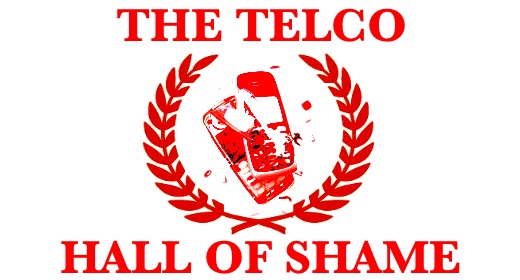Inductee: AT&T Inc.
Headquarters: USA
CEO and Board Chairman: Randall L. Stephenson
CORPORATE INFO
Network Size: More than 103 million wireless, 16.4 million broadband users, and 36.7 million access lines users in 2011.
Countries of Operation: “AT&T provides communications services to customers in virtually every country and territory in the world.”
Finances: $4.1 billion net income in 2011
HUMAN RIGHTS POLICY
“We are committed to respect basic human rights. We believe that the freedom to access information, the freedom to communicate and the respect for personal privacy are essential to the advancement of human potential.
…
We will work with governments, industry, consumers and civil society to promote human rights around the world in areas associated with our operations.
…
We believe governments should narrowly tailor such restrictions to meet those objectives, and should base any such restrictions in transparent laws and regulations to the extent permitted by law. When faced with such restrictions, AT&T will validate the legality of the restriction under applicable law and seek to minimize any adverse impacts on our users. We will generate periodic reports regarding our experience with such requests to the extent permitted by the law. We encourage the national governments to address human rights issues with other governments directly.
…
AT&T supports and respects the protection of basic human rights, and seeks to ensure we are not complicit in human rights abuses. We respect and protect the freedom of expression of our users. We respect and protect our users’ right to privacy.”
THE RECORD
Facilitating warrantless wiretapping for the National Security Agency (NSA)
In 2006, a retired AT&T technician revealed that the company had helped the National Security Agency (NSA) install a secret room in its San Francisco switching center where all telephone activity was routed. Reports indicated that these rooms were being installed throughout the United States. This allows the NSA to store, monitor, and analyze without a legal warrant or court order all national and international telephone activity.
News reports indicated that this was part of a broader pattern of cooperation between US telcos and the NSA. The NSA has built a national database to analyze calls, and asked the telcos to turn over detailed records of the calling histories of their customers — AT&T complied with this order. One US telco, Qwest, refused to cooperate due to unanswered questions regarding the legality of the program.
In response to these disclosures, AT&T revised its privacy policy to say that the company, and not customers, owned user data and could share it however it pleased. The new policy stated “While your account information may be personal to you, these records constitute business records that are owned by AT&T.”
In 2006, the Electronic Freedom Frontiers (EFF) filed a lawsuit against AT&T on behalf of its customers for violating privacy laws through their cooperation with the NSA. The case made headway until 2008, when the US Congress enacted retroactive immunity for AT&T. In 2012, the US Supreme Court declined to hear the case after a series of appeals.
The EFF has also filed a suit against the NSA on behalf of AT&T customers; that suit is currently going through the judicial system.
Compliance with law enforcement agency requests for information
In 2012, US cell phone service providers responded to a Congressional request to detail the extent of their cooperation with law enforcement requests for user information. All carriers reported that the number of requests were increasing dramatically over the previous five years.
AT&T stated that in 2011, it complied with 246,600 requests for user data and phone records, and rejected a mere 969 requests because they were improperly filed.
Suing hacker who revealed security breach
In 2010, a computer programmer and hacker found that users who visited AT&T’s website on an iPad would be directed to an unencrypted, publicly available URL based on the device’s SIM card number that displayed their name and email address. By writing a script that generated all possible SIM card numbers, he gathered over 100,000 user names and email addresses of AT&T customers from the website and publicized the security breach. AT&T sued, and he was convicted of identity fraud, causing security experts everywhere to warn of a “chilling effect” on other programmers who discover security flaws.
Six-strike rule for copyright infringers
AT&T is part of a consortium of ISPs working towards implementing a “six strikes” response to users who allegedly infringe US copyright laws.
The six-strike rule will essentially disconnect users from the internet who are merely accused of online copyright violations, without legal adjudication. Known as the “Copyright Alert System,” AT&T users will receive a warning that they have been accused of copyright infringement, and then be required to acknowledge the receipt of the warning. If copyright holders continue to file complaints, AT&T will block the user from accessing “many” of the most “frequently visited websites.”
The ISPs are describing the system as “educational,” and not punitive.
This policy could also inadvertently shut down public Wi-Fi hotspots, such as in airports or coffee shops, by holding the owners accountable for the activities of users.
The 6-strike rule will essentially disconnect users who are merely accused from the internet, without legal adjudication.
Violating net neutrality for all but premium clients
US-based advocacy and research organizations Free Press, Public Knowledge, and the New America Foundation’s Open Technology Institute have filed a legal complaint asserting that AT&T has violated the FCC’s Net Neutrality regulations by blocking Apple’s Facetime program from all but the most expensive data plans.
Know something about AT&T that we missed? Let our telco policy expert Peter Micek know [email protected] | Public Key: 0x22510994
